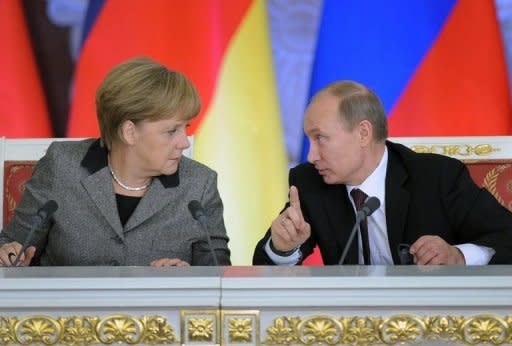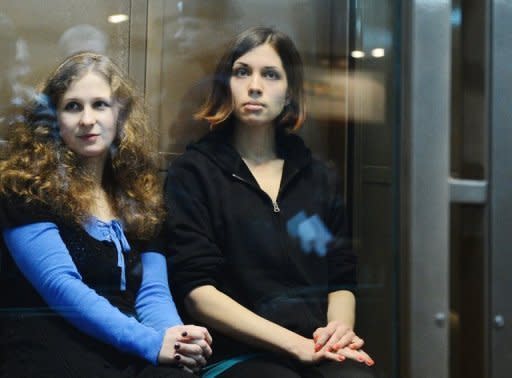Putin, Merkel spar over Pussy Riot in Russia talks
German Chancellor Angela Merkel Friday clashed with Russian President Vladimir Putin over the jailing of feminist rock band Pussy Riot as growing bilateral tensions over human rights flared in public. Hosting Merkel on a visit to the Kremlin, Putin took issue with German criticism of Russia's treatment of the women, two of whom have begun two-year prison camp sentences for performing an anti-Putin song in a church. Using his trademark provocative language, Putin asked Merkel if she was aware of a previous stunt performed by associates of Pussy Riot which involved, as the Russian leader, put it "an effigy of a Jew". "We hear our partners, but they hear what happens from afar," said a visibly irritated Putin at a German-Russia forum ahead of formal talks. "So the chancellor mentioned the girls who are in prison for performing in a church. But does she know that before one of them hung up an effigy of a Jew and said that we need to get rid of such people in Moscow?" Putin asked. "You and I cannot support people who have anti-Semitic views," he told Merkel, who sat next to him in a chair looking uneasy. At a later news conference Putin added: "I think one should understand what sort of people we are dealing with. I don't think modern Germany should support anti-Semitism." He was apparently referring to a 2008 performance by political art group Voina, or War, in a Moscow hypermarket where they staged stylised lynchings of migrant workers and gay men to highlight discrimination against them. One of the Pussy Riot members, Yekaterina Samutsevich who has now been released, can be seen in video footage of the Voina performance. Putin was responding after Merkel questioned if the women "would have received two years in a labour camp" in Germany. "Our (German-Russian) friendship will not be better if we sweep everything under the carpet," she said. --- 'Criticism need not be destructive' --- On her visit, Merkel sought to tread a fine line between expressing rights concerns and the need to protect Berlin's economic interests as a top client of state gas giant Gazprom as well as a leading investor in the overhaul of Russian infrastructure. "I ask that not every bit of criticism is seen as destructive," said Merkel. "We want Russia to be successful." On the eve of the visit, German lawmakers from Merkel's coalition urged the government to push for more democracy in Russia as they expressed concern over a crackdown on civil society since Putin's return to the Kremlin in May. But Merkel, accompanied by eight ministers and a dozen business leaders, had clear economic priorities. German engineering giant Siemens signed an agreement worth 2.5 billion euros ($3.2 billion) to supply Russia's state-owned railways with 675 locomotives in a joint venture with the Russian company Sinara Group. The agreement was signed by Siemens chief executive Peter Loescher and Russian Railways (RZD) chief Vladimir Yakunin at a Kremlin ceremony attended by Putin and Merkel. Russian Railways "expressed its intention of buying 675 two-section cargo electric locomotives in the period from 2016 to 2020," Siemens said in a statement. Sinara Group's chief executive Dmitry Pumpyansky estimated the contract at around 2.5 billion euros. A fluent German speaker who spent five years as a KGB agent in Dresden, Putin has long prided himself on building a solid working relationship with Merkel yet it has lacked the warmth seen under her predecessor Gerhard Schroeder. Moscow had been particularly needled by the public comments of Andreas Schockenhoff, a German lawmaker charged with coordinating relations with Russia, who has shown no fear in taking issue with the Russian rights record and is accompanying Merkel to Moscow. In a sign of the tensions, Shockenhoff's office said he had been denied access to the Russian parliament and had also not been granted any meeting with officials at the Russian foreign ministry.



